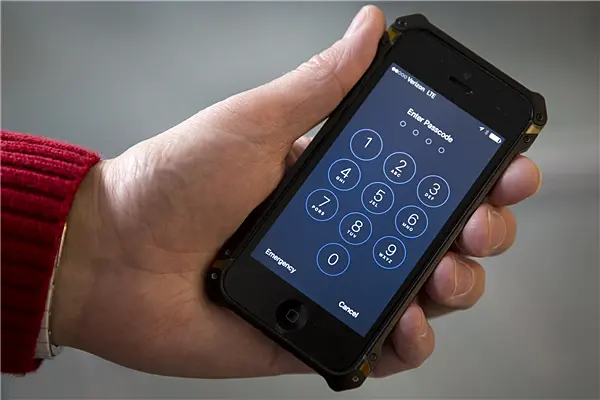Unlocking San Bernardino shooter’s phone is a slippery slope of allowing government access to private companies’ data. Photograph: Carolyn Kaster/AP
(THE GUARDIAN) Both the motion Tuesday ordering Apple to help the FBI access the contents of San Bernardino shooter Syed Farook’s encrypted iPhone – and Apple CEO Tim Cook’s public letter refusing to do so – appear to be the latest volley in a dispute over encryption that has been going on between law enforcement and Silicon Valley, off and on, for over 20 years.
Though the FBI’s request studiously avoids asking Apple to directly decrypt Farook’s data or hand over his key, the debate is the same: can law enforcement compel tech companies to provide the means to access consumers’ data?
Apple’s switch to default encryption on iPhones has been a subject of complaint from law enforcement since its introduction in 2014, but the FBI’s current request seems to intentionally side-step the encryption question, instead requesting Apple’s assistance to bypass non-encryption features of the iPhone in order to get at its currently encrypted contents.
While the particular model of iPhone in question here means that it may be technically feasible for Apple to comply with the FBI’s request, this is not the true heart of the issue. As Cook’s open letter to customers stating that Apple would oppose the order points out, the request “has implications far beyond the legal case at hand”.
Cook’s letter makes a point of characterizing the software solution that the FBI is requesting as a “backdoor”, situating the request squarely in the middle of the broader debate about whether the government can make tech companies provide access to customer data.
Though the FBI’s request does not ask Apple to produce software that acts as a “master key” for Farook’s phone – the kind of solution that has been at the center of previous debates – if Apple complies with the current request then the end result is the same: the company would have to produce a software workaround that would allow the agency to bypass enough of the iPhone’s security so that it would be possible to quickly and automatically brute-force Farook’s passcode, thereby decrypting its contents.
Whatever the term used (in 2014, FBI Director James Comey insisted that his agency was not seeking a “back door”, but a “front door”), this software for providing “exceptional access” to the contents of Farook’s phone, once created, could theoretically be obtained and used by bad actors on other devices.
Even if the software could somehow be made specific only to Farook’s phone (which is not necessarily possible) and completely protected from unauthorized use (which is not likely), “exceptional access” is a precedent that travels poorly. As highlighted last summer in an article authored by a who’s-who list of cybersecurity experts:
This is not only a US issue. The UK government promises legislation … to compel communications service providers, including US-based corporations, to grant access to UK law enforcement agencies, and other countries would certainly follow suit. China has intimated that it may require exceptional access. If a British-based developer deploys a messaging application used by citizens of China, must it provide exceptional access to Chinese law enforcement?
While the FBI may only be concerned about issues on US soil, Apple has global jurisdictions – and markets – to consider. At a time when US technology companies are already on their back feet on privacy and security issues in Europe and elsewhere, a future in which governments can compel access to users’ data on whatever grounds they see fit would put them at a serious competitive disadvantage.
Moreover, it’s unclear from the current fillings to what extent the FBI has exhausted all available means to obtain copies of the information that might currently be on Farook’s device. Theoriginal filing indicates that the phone – which is actually owned by Farook’s employer – has iCloud backup enabled, the contents of which the FBI could easily access through existing legal methods.This leaves the particular importance of direct access to the device unclear.
The All Writs Act – the 1789 law upon which the FBI’s argument for requesting Apple’s help rests – only requires that third-parties provide “nonburdensome technical assistance”. And given Cook’s assertion that the software requested “does not exist today,” it seems likely that Apple will avail itself of the final option in Magistrate Sherri Pym’s order, which allows the company to reject it within five business days on the grounds “that compliance with this Order would be unreasonably burdensome”. Clearly, a few hours was more than enough to do so.
 简体中文
简体中文

